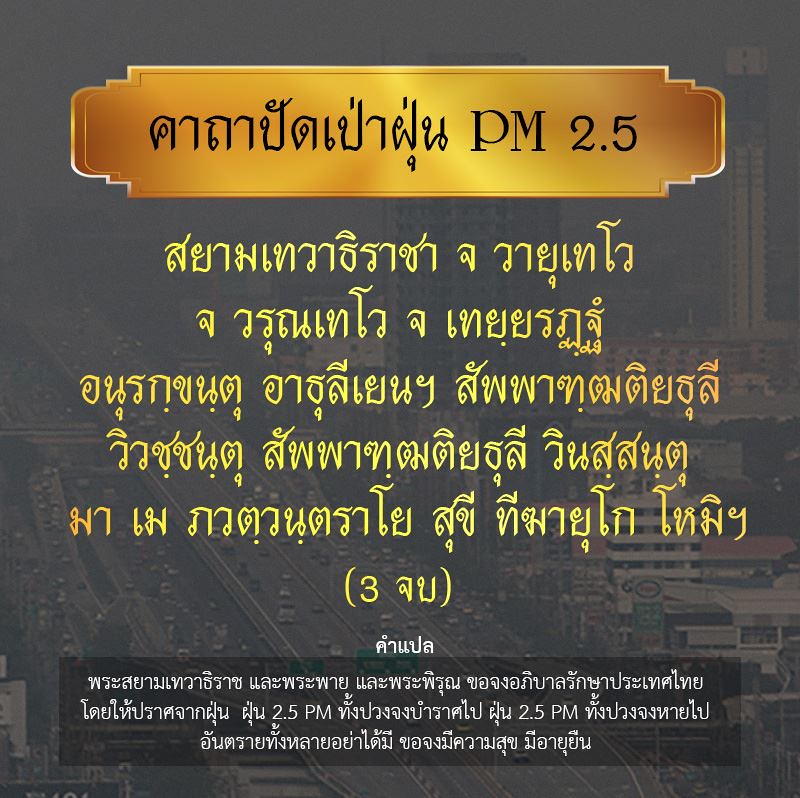Measurements of the Air Quality Index (AQI) are showing unhealthy levels of pollution in Bangkok, with regular ‘unhealthy’ readings for PM2.5, particularly dangerous particulates with a diameter of 2.5 micrometres or less, capable of penetrating the lungs and blood stream.

AQI readings for Bangkok for 2 pm on 15 January 2019
The government response has not been very effective, relying on temporary solutions to what seems to be a long-term problem rather than tackling the structural issues at root. The Bangkok Metropolitan Administration called in fire trucks and water trucks to spray water into the air around critical areas, such as Lumphini Park, to settle dust. It should be noted that these attempts were made especially at the sites of air quality monitoring stations. The BMA also said that they will spray water and clean roads around the city more frequently. Meanwhile, the Department of Royal Rainmaking and Agricultural Aviation has launched an operation to create artificial rain over the city, hoping that this will help improve the situation.
Urban air pollution issues are not unique to Bangkok. Many big cities around the world face similar problems, with the major source of man-made pollutants coming from the burning of fossil fuels, notably from car emissions. Many cities employ car control measures in order to keep pollution levels down.
London imposes fees for driving in the city centre, where its extensive bus and rail network renders the use of private cars unnecessary in most cases. The city also plans to phase out its diesel double-decker buses and replace them with electric ones and will require any new taxi to be zero emission in order to be licensed. Paris, like many other European cities, has designated many inner-city districts as car-free zones, and plans to ban all petrol vehicles by 2030. China, also facing high levels of air pollution in its major cities like Beijing, is tackling the sources of pollution by limiting the use of coal and controlling construction dust.
Meanwhile, in Bangkok, the public are on self-help mode, relying on air quality monitoring applications and social media for information. People have been flocking to pharmacies in search of N95 masks, which according to the internet is the only way of protecting themselves from PM2.5 particulates. Demand has far outstripped supply, and N95 masks are nowhere to be found in the market, except in online stores. Bangkok Governor Aswin Kwanmuang ordered 10,000 N95 masks to be distributed to the public. This would help about 0.12% of the city’s population of over 8 million.
While the population of Seoul received official emergency alerts as its own pollution levels rose earlier this week, people in Bangkok rely on Facebook posts and messages from friends and family. The government seems to see this as a temporary problem, hoping that their ad hoc measures will solve the problem without them having to tackle any of the underlying structural issues. Bangkok’s public transport system also can no longer support the size of its population and any campaign to reduce car use is unlikely to succeed.

Mantra on facebook to chase the dust away
All people can do now is to turn to prayer and sarcasm. One Facebook post of a mantra to chase the dust away, written in the Pali language of the Buddhist scriptures, has gone viral with a thousand likes and shares. On 10th January, Prime Minister Prayut Chan-o-cha said that prayer worked against Tropical Storm Pabuk. Netizens have arranged an event on Facebook to pray the dust away for health - now with almost 3,000 participants who have clicked ‘join’. Some of them may truly be desperate believers, but prayer here is also a way of expressing defiance and a sarcastic message to a government has been so ineffective that relying on prayer is better than asking it for help.
Prachatai English is an independent, non-profit news outlet committed to covering underreported issues in Thailand, especially about democratization and human rights, despite pressure from the authorities. Your support will ensure that we stay a professional media source and be able to meet the challenges and deliver in-depth reporting.
• Simple steps to support Prachatai English
1. Bank transfer to account “โครงการหนังสือพิมพ์อินเทอร์เน็ต ประชาไท” or “Prachatai Online Newspaper” 091-0-21689-4, Krungthai Bank
2. Or, Transfer money via Paypal, to e-mail address: [email protected], please leave a comment on the transaction as “For Prachatai English”
